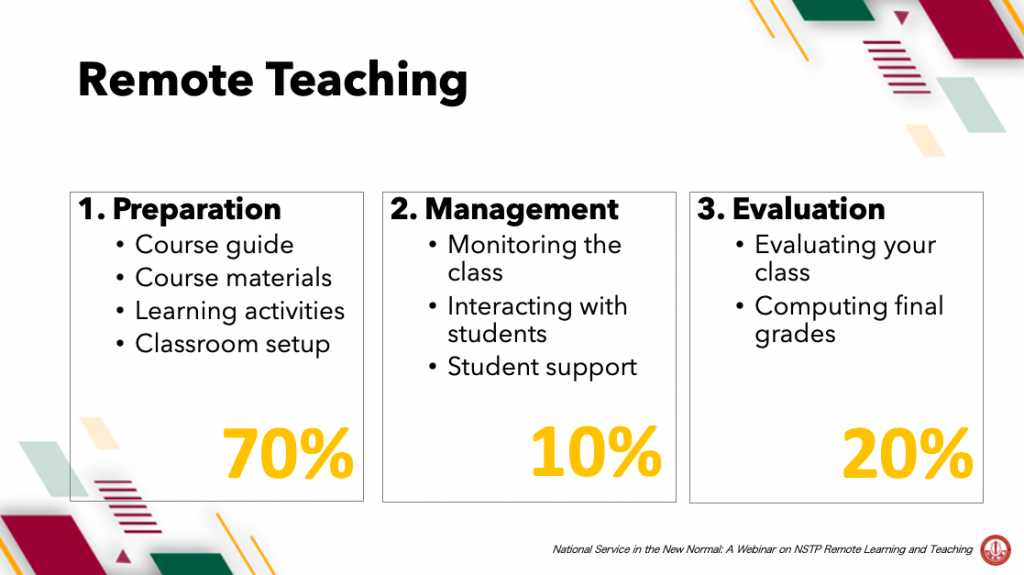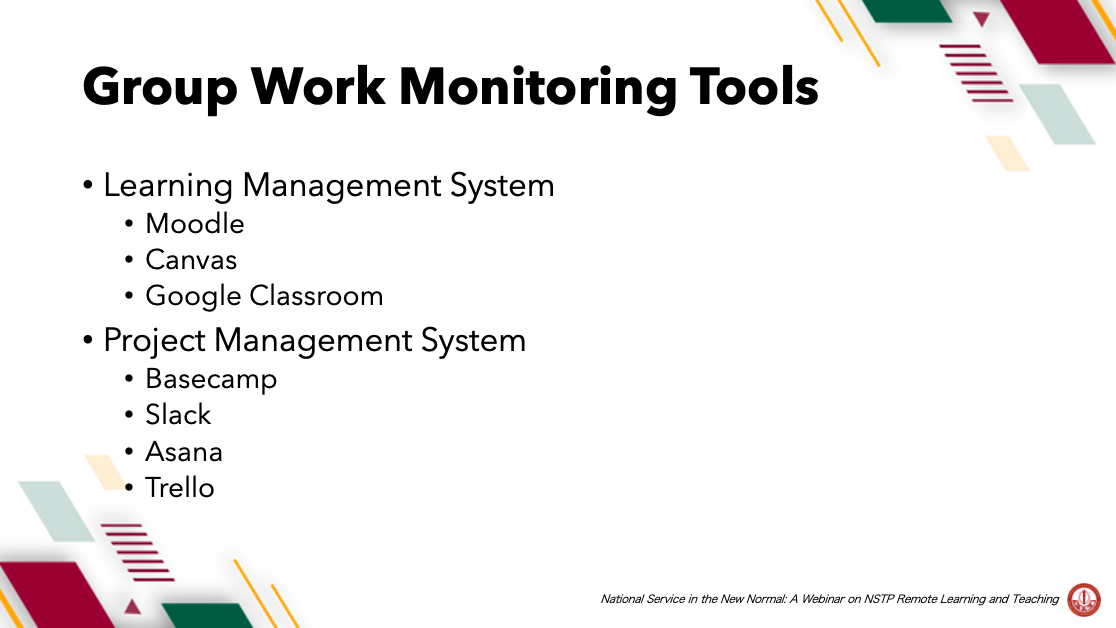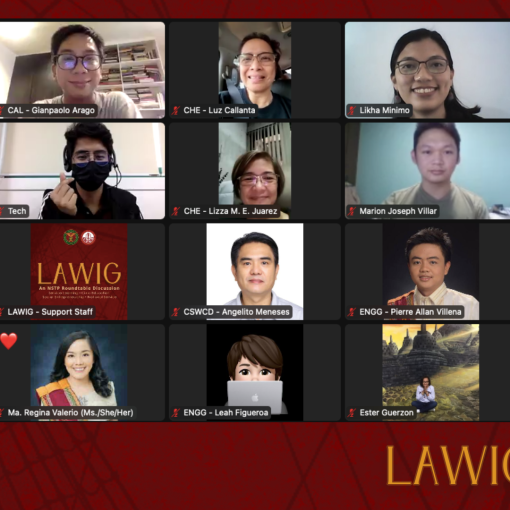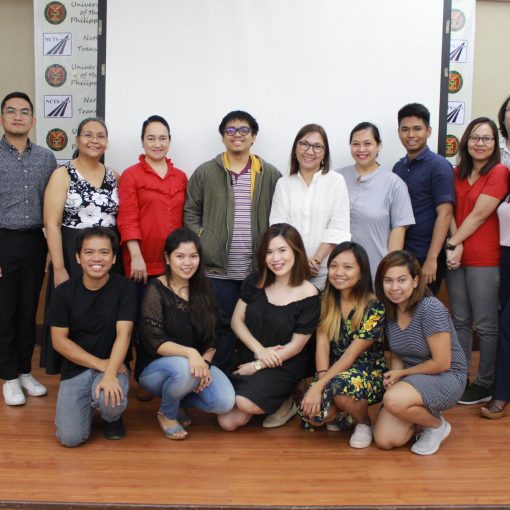Over two hundred NSTP implementers from different higher education institutions (HEIs) around the Philippines attended the NSTP Diliman hosted National Service in the New Normal: A Webinar on NSTP Remote Learning and Teaching last August 28, 2020 via Zoom and YouTube livestream. An activity spearheaded by the NSTP Diliman Office, the free webinar aimed to provide training for implementers in light of the transition to a remote mode of learning and course delivery for NSTP.
NSTP Diliman Director Dr. Jonalou Labor warmly welcomed the webinar participants and also gave an overview about NSTP Diliman’s undertakings in terms of remote learning. Dr. Labor shared how the collaborative effort of NSTP Diliman implementers enabled the unit to address some of the most common changes and challenges posed by the pandemic in terms of course delivery. As a national university, UP Diliman is very much willing to offer the help it could provide to the larger community of NSTP implementers through the products of its course redesigning initiatives and projects.
After the opening remarks, Dr. Labor introduced Dr. Ria Mae Borromeo, a professor teaching Computer Science and Information Systems Courses and the incumbent Director of the Information and Communication Technology Development Office (ICTDO) of the UP Open University. Dr. Borromeo highlighted in her talk titled NSTP Remote Learning and Teaching the importance of the preparation stage as the major component of remote teaching. She then discussed main considerations in choosing content, delivery mode, technologies, learning resources, assessment, and learning activities for a remote mode of course delivery. Lastly, she shared and explained the course design of NSTP Civic Welfare Training Service (CWTS) 1 and 2 of UP Open University to the webinar attendees. Possible volunteer opportunities for CWTS 2 in UP Open University are clustered into different community service tracks which range from literacy to sports and fitness, health and wellness, environment welfare, livelihood, music and visual arts, and relief operations, among others.

Ana Maria Raymundo, a development sector professional and Public Administration graduate student at New York University, the second speaker, discussed Community Engagement through Remote Initiatives. She enumerated four main points in her talk: set the parameters, choose the projects, articulate desired outcomes, and project monitoring. Miss Raymundo expounded that embarking on remote community engagement projects entails the reimagining of the definition of “community” as not limited to physical space location-based aspects but also considering groups of people with common history or interests. The concept of “service learning” was emphasized in the lecture as essential in realizing course objectives and benefiting communities. Viewing NSTP as a form of service learning would mean actively involving the students in community engagement projects by allowing them to explore topics, issues, and themes that they care about or are interested in. Moreover, the discussion also provided the participants with examples of potential remote projects and topics across different remote and online platforms.

NSRC Deputy Director Prof. Giovanni Legaspi reintroduced Dr. Borromeo for the last lecture: Assessment and Evaluation for Online Group Work. She listed and discussed different online collaborative and group work monitoring tools that instructors and students can explore. She also provided the participants with possible means of offline collaboration and clarified that while these are more challenging, they are still doable. Moreover, she talked about output assessment, peer assessment, and self-assessment. According to Dr. Borromeo, it is important that teachers establish a learning environment that clearly explains the criteria and encourages the process of self and peer assessment so that students will be able to evaluate their performance confidently and critically.

Assessment and Evaluation for Online Group Work Lecture Slide (Dr. Borromeo)
As the last lecture came to a close, the floor was opened to the questions raised by participants. Both resource persons addressed the questions and concerns of participants as they reiterated the key points of their discussions and even provided more examples and elaboration. Prof. Legaspi then delivered a synthesis of the lectures and expressed thanks to the resource persons and participants as he formally closed the webinar. In his closing remarks, Prof. Legaspi reiterated that UP Diliman is committed to helping other universities and educational institutions in bringing new ways of teaching and learning. Through creativity and collaboration, NSTP implementers from all over the country will be able to surmount the challenges of remote learning and succeed in instilling to the youth a spirit of volunteerism and service to the community and the nation. The activity received positive reviews from the participants as reflected in the event evaluation with some participants even expressing that they are looking forward to more activities like this in the future.

The NSTP Diliman Office is in charge of the implementation and development of the Tatak UP National Service Training Program. The Office is expected to oversee the academic activities of all colleges and units that offer the NSTP courses. The Office, together with the NSTP Council, is responsible to uphold honor and excellence in the University through relevant and transdisciplinary projects that will nurture volunteerism in the UP community.
by Jillian Santos





